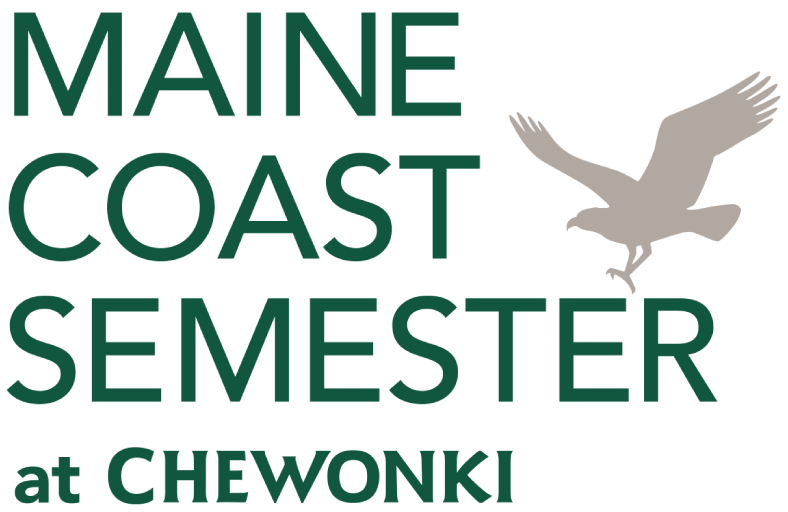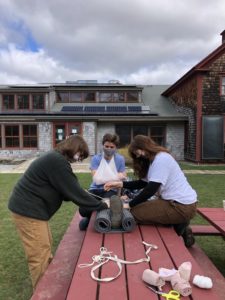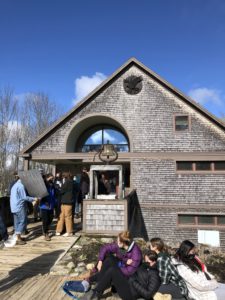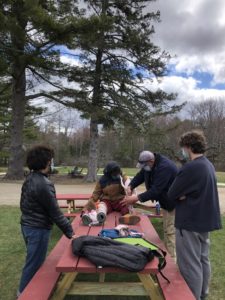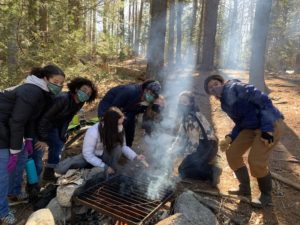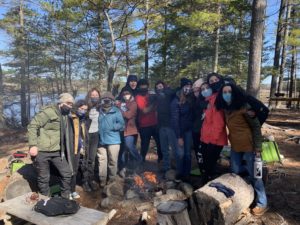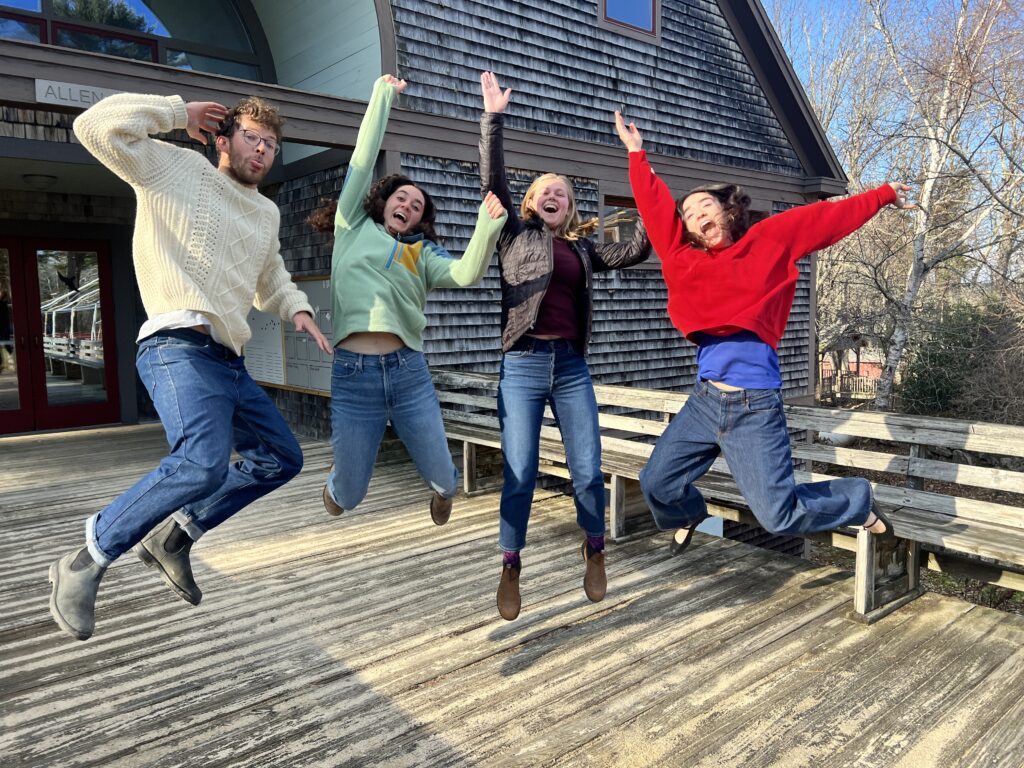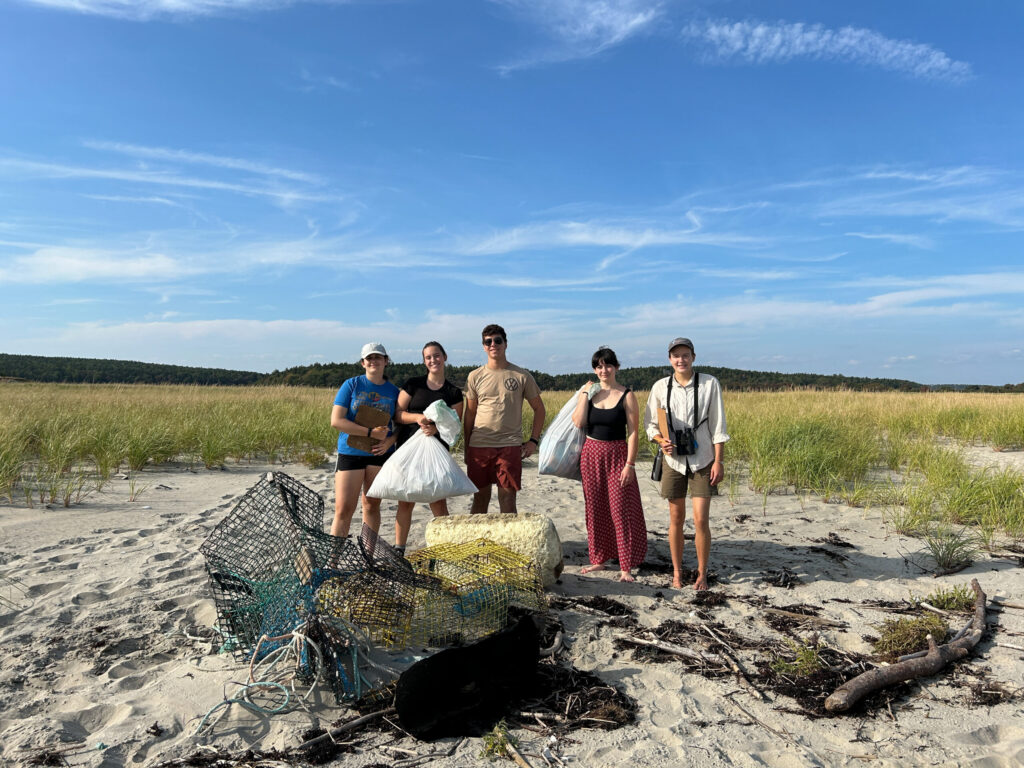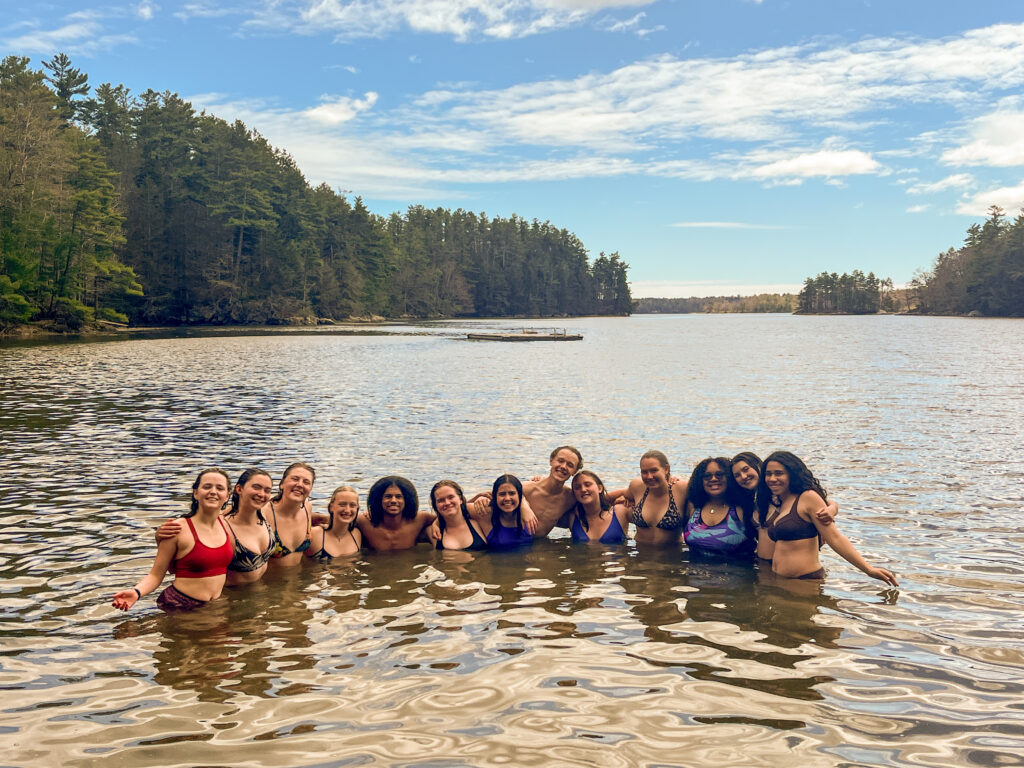The weather on that Thursday was stunning. Sunny, mid-60s, with a dash of afternoon cloud that added flavor to an otherwise clear, blue sky. We gathered in the Allen, a communal space that was at this time devoted to our two-day lesson, and awaited the class’s beginning. Eric, our instructor, sat to the side of the commotion until he was sure he’d had our attention. This moment was when he unleashed.
Your friend accidentally cartilage pierced their ear with a stick in the woods. What do you do? Your annoying little brother who knows he’s allergic to peanut butter goes into anaphylactic shock after ingesting a Reese’s Butter Cup. How do you respond? You, as cunning, smart, and scarily coordinated as you are, become submerged under water and can’t flip your canoe back up. What is your course of action? Well, never fear… WFA class is here!
Wilderness First Aid, or WFA for short, was a two-day course that ran from April 22nd-April 25th, also known as Outdoor Leadership Weekend. We learned the fundamentals of health care, such as how to tie a splint, how to perform CPR, how to quickly deduce what physical ailment a person is going through, and how to clear a scene to ensure maximum safety. The last day of the course for groups 3 and 4 began on a cold, blustery morning, the first of two that weekend.
It was on that next cold, snowy morning that we started our trek. “Flurries in the middle of April?”, I wondered as we waddled down the rocky hill. Pack-Out, the area that most of us recognize as the location from which we picked up our crazy creeks the first week, was now in our sights. Our hands tickled with anticipation and a rushed blood flow, made more evident by the blast of cold air that had just taken refuge in Wiscasset, Maine. A hint of winter in the springtime had been bestowed upon us, and the best that we could do was hope for the fleeing of the flurries by nightfall.
We said our hug-filled goodbyes to the members of other groups and headed towards the woods. Red Pines, an encampment about a 15 minute walk from Pack-Out, would be our residence for the next 24 hours. We replicated Demi Lovato’s lovely group step rendition in “Camp Rock” on the way there (tag yourself, I’m Joe Jonas), and before we could even ponder what the next part of the routine was, we’d arrived. The loads that we’d been carrying (ask a Chewonki student what a honey bucket is) were plopped onto benches with haste, and a sigh of relief visibly escaped our lips in our breath. In an effort to generously relieve the group of back pain, Hollis Kolvenbach, a fellow student and friend of mine this semester, offered to safely arch us backwards until we heard something crack. He came off as a professional, so I happily obliged. No semester students were harmed in the relieving of this physical stress!
After arriving at the campsite, a group of us students huddled in the “residential” section of the grounds. A collection of trees grouped somewhat closely together would serve as the henchman for our hammocks, and although no one took this route, wooden planks were available for a more naturalistic sleepytime approach. Before long, we all grouped together in the “kitchen” (a tarp over a wooden table with food on it) and prepared our lunches. SunButter and Jelly sandwiches remain undefeated.
Soon enough, it was time to set up our homes. This is where I began to feel the inexperience of growing up in an urban area, as relates to nature: it first manifested itself in me not knowing how far trees actually had to be in order to hammock, and then double-whammied into me struggling with knots for 45 minutes. Shoutout to Chandler for chaperoning me and my fingers as I worked my way towards tying a Trucker’s Hitch!
Setting up our sleeping areas generally took around an hour, MTV “Welcome to My Crib” tours and impromptu housing photoshoots factored in, of course. After the backbreaking energy we’d just exerted on establishing shelter, most of us simply wanted to lounge around in the presence of the friends that we’ve made. We all gathered on a rock, overlooking the point, and out from behind the clouds began to peak the sun. The sounds of laughing, hooping, and hollering shook the trees that sat behind us, and being that we are all Covid negative and can be in close proximity, the cuddle puddle that we had was incredible. We sat for what felt like eons, and soon enough, it was time to prepare our dinner.
Dinner groups were fourfold: while some people were actually preparing the food, others were chopping wood, some were gathering kindling to fuel our fires, some were at the point gathering water for dishwashing, and others were charged with clean-up after the grub. This cohesive set-up led us to finishing with ample time: we took our first bite of Shepherd’s Pie as the sun began to go down over the Salt Marsh. We ate around the fire and did our best to dodge the smoke as people talked. The conversations ranged from interest in astrology, to backpacking trips in the Colorado Rockies, to someone asking Hannah Ryde what the worst meal she’s had on a backwoods expedition was (hint hint, not ours). We cleaned up after dinner rather quickly, and prepared for the next, more thrilling part of our night: one. hour. solos. Boom.
A staple of Maine Coast Semester are the solo expeditions that students take part in, in which we stay on a specific section of Chewonki Neck alone for two nights. Our solo dates this year are in early May, and in preparation for this task, the Outdoor Leadership Weekend organizers decided to send us on a one hour night solo to mimic the actual experience. For an hour, 42 Semester 66 students lined various parts of the Chewonki wilderness in an effort to simulate what we will be going through in about one weekend. Many of us wrote, many of us cried, many of us thought, many of us sat, and many did nothing at all. I slept. :)
Upon returning to the campgrounds after our mini-solos, we debriefed our experience around a fire. My head resting on my friend Elizabeth Dunn’s shoulder, and my voice shaking groggily with a coating of tiredness weighing it down, I recited just how lovely my nap was, and my desperation to continue it later that night. However, this desperation soon dissipated as s’more materials were brought out of their bags, and for an hour more, many of us sat around the fire and laughed as crumbs lined our laps.
After brushing our teeth in the estuary and hugging each other goodnight, we retired to our hammocks and engaged in a good night’s sleep. The next morning, for many of us, was filled with back pain and descriptions of odd dreams, and after preparing/consuming another slamming breakfast dish, we packed up our things and headed back towards campus. The reunion with our friends was sweet but polarized, with half of the group uttering “I missed you so much!” and the other half whispering “It hasn’t even been a day…” After getting over the general weirdness of catapulting back into a large social setting, I settled down, ate a lovely panini prepared by “grill dad” Nate Zuckerberg, and recounted my night with the people I hadn’t spent it with.
Overall, Outdoor Leadership Weekend was an incredible experience. I can now say that I am better at tying trucker’s hitches, I have spit toothpaste into an estuary (I PROMISE this is sanitary), and I’ve slept in a hammock without a sleeping pad! A more successful sentence has never been spoken :)
Until the next adventure on the Maine Coast!
Andre Williams, Princeton Day School, Lawrence, NJ
